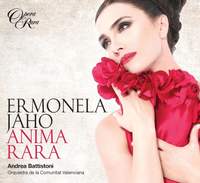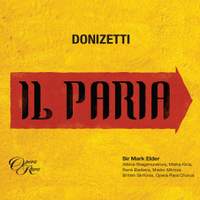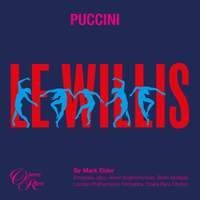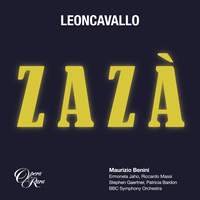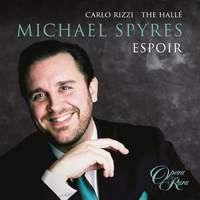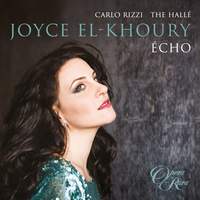Interview,
Opera Rara at 50
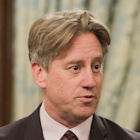 Founded in 1970 to ‘rediscover, restore, record and perform the lost operatic heritage of the nineteenth and early twentieth centuries’, Opera Rara’s recent triumphs include an uncut, period-instrument recording of Rossini’s Semiramide, the original one-act version of Puccini’s first opera Le Willis, and the world premiere performances and recording of Donizetti’s abandoned opera L’Ange de Nisida.
Founded in 1970 to ‘rediscover, restore, record and perform the lost operatic heritage of the nineteenth and early twentieth centuries’, Opera Rara’s recent triumphs include an uncut, period-instrument recording of Rossini’s Semiramide, the original one-act version of Puccini’s first opera Le Willis, and the world premiere performances and recording of Donizetti’s abandoned opera L’Ange de Nisida.
As the company celebrate their fiftieth birthday, I spoke to their Chief Executive Henry Little about the label’s raison d’être, its influence on the wider operatic community, and what’s coming up under the leadership of their new Artistic Director Carlo Rizzi…
What attracted you to your role at Opera Rara, and how would you describe the label's philosophy?
I’ve worked in opera all my life in various capacities, and I think that one of the major challenges which the art-form faces is that the repertoire-choices are incredibly narrow: if you look at the programmes of fifty companies across the world you’ll find a very acute concentration on about ten or fifteen works. This is completely different from theatre, which is much broader, and also has a much livelier programme of new writing: that’s not to say that there aren’t fantastic new opera commissions (the George Benjamin/Martin Crimp collaborations are a shining example of how successful new operas can be) but because operas are incredibly expensive to put on, it’s more difficult to generate that volume of new writing in the way that it is in theatre. One response to that is to look to the past with fresh eyes, and the function of Opera Rara is to encourage a broader view of the existing repertoire: we’ve proved that what we do sends a message to opera companies that these pieces deserve to be seen and heard as much as the more regularly programmed titles do.
In a world that's increasingly geared towards streaming, do you find that there's still a global market for well-documented, lavishly-presented sets?
I think there is, because Opera Rara sells its recordings genuinely worldwide: from Buenos Aires to Trondheim over to eastern Russia and Japan. I always describe what we do as ‘live operatic archaeology’ – and what I mean by that is that the recording which we end up with is the result of several years of incredibly meticulous, pioneering research into the reconstruction of a piece that has been neglected in some cases for hundreds of years. The reason we deliberately invest so much in our booklets and the printed material that accompanies all our recordings is that we want to give our listeners a sense of that journey: we know our audiences really enjoy being part of that, because no work of art is successful without a real connection with the audience. People need the context for what they’re hearing, so they want to learn about that long painstaking process behind every project we undertake.
Take the case of Donizetti's L’ange de Nisida, which we did in partnership with the Royal Opera House in July 2018: this was an incredible project, because it was the very first time the piece had been performed, and it was very much a process of 'archaeology' in that it involved going back to the foundations and metaphorically digging for the various bits of the puzzle to bring it all together. Scholars had considered it impossible to reconstruct this opera after Donizetti had abandoned it when the commissioning theatre in Paris went bankrupt; everybody knew that it existed and that a significant chunk of the material was diverted into what was to become La Favorite, and in fact our founder Patric Schmid (who died in 2005) often said that it would be really interesting to see if it was possible to bring it to life. That’s exactly what we did, but it was an exercise that took nearly ten years. The young musicologist Candida Mantica made a technical reconstruction of the piece as part of her PhD at the University of Southampton, and that led to her new performing edition, which was what we used for the premiere.
In the case of Il Paria, which we’re going to release next January, the existing edition bore very little resemblance to what Donizetti actually wrote; in particular, some of the stratospheric writing for the tenor had been transposed down, so we went back to the original and created a brand-new edition which we used for our recording.
Do you find that Opera Rara's advocacy of neglected works translates into fully-staged performances elsewhere further down the line?
Absolutely, and this is an aspect of our work that really pleases me. In the summer of 2016 I attended an Opera Europa conference in Amsterdam where I met Francesco Micheli, the Artistic Director of the Donizetti Festival in Bergamo, and when I mentioned L’ange de Nisida his eyes lit up. Bergamo is the town where Donizetti was born and raised and had his first successes under the guidance of Simon Mayr, and Francesco was adamant that they needed to stage the piece there as part of the festival once we’d given the work its premiere in concert. True to his word, the festival gave two fully-staged performances in November 2019; it’s fantastically satisfying when that kind of thing happens, because it sets the piece on a journey and sends a message to the wider opera community that the work is worth their attention.
There are other examples: when we did Zazà (which was the very first recording and concert project I ever did with Opera Rara) the piece had been staged at Wexford ten years earlier but it hadn’t really gone anywhere; after our performance Opera Holland Park did a run in their 2017 festival. And Fantasio, which was part of our Offenbach rediscovery series, was staged by Garsington last summer and has also been done at the Opéra Comique and in Geneva. I’m not saying this is all because of Opera Rara, but I do think that what we do serves to create awareness that there is a world beyond the existing core repertoire.
Do you tend to commission musicologists to work on each particular reconstruction, or have there been cases where scholars have approached you with a project of their own in mind?
It’s a mixture of the two, and it all happens under the guidance of Roger Parker, whom I often refer to as Opera Rara’s secret weapon; until recently Roger was a professor of musicology at King's College London and he’s one of the world’s leading nineteenth-century Italian opera specialists, so he acts as our archaeological guide and guru. Roger will look at a piece like Il Paria and say: ‘This is really worth doing…forget about the previous performances, we can do something really special’. That kind of objectivity is invaluable, because in the instances where there are existing recordings of these works I have to admit that they’re often pretty terrible!
We’re also able to draw on Roger’s contacts in the academic community to bring early-career musicologists on board, and that’s another important aspect of what we do: linking musicological practice with creative performance, and ending up with a product that’s going to be there for future generations as well as for current audiences to enjoy. It seems to me that Opera Rara acts as a vital bridge between an academic world that’s slightly closed and extremely specialised and a recording and performance environment which is very much about inviting the widest possible audience to enjoy and experience this music for the first time.
What else can you tell us about future plans with your new Artistic Director, Carlo Rizzi?
The next big thing is Donizetti's Il furioso all'isola di San Domingo, which we were originally planning to do in June; we’ve assembled the most fantastic cast possible, and another wonderful young Italian musicologist, Eleonora di Cintio, has prepared the edition. She’s rediscovered versions which haven’t been heard since the premiere performances in 1833 and we’ll be looking for ways to integrate them into our recording, so watch this space for recording and performance announcements! We’re also looking at other Donizetti titles: people might say ‘Come on folks, you’ve already done twenty-four of his operas: you must be scraping the bottom of the barrel by now!’, but this is someone who wrote over eighty operas and did so with extraordinary skill (and not a little speed, given that he died so young).
Beyond that, we want to forge ahead with our adventure in Italian verismo, which began with Leoncavallo's Zazà with Ermonela Jaho and continued with the original version of Puccini’s Le Willis (also starring Ermonela). One piece which we particularly have our eye on is Leoncavallo’s one-act opera Zingari, from 1912; it’s basically the story of Il Trovatore, but condensed down to just over an hour with an extraordinary searing intensity. We also want to do more French operetta; Opera Rara’s very first project back in 1970 was a version of Offenbach’s Robinson Crusoe at the then Camden Festival, so this trajectory goes back a very long way in our history. And we’re eager to start exploring nineteenth-century French grand opera - there’s a real mine of interesting pieces by composers like Halévy, Auber and Massenet which deserve the Opera Rara treatment, so with Roger’s guidance and Carlo’s leadership we’re looking very closely at those.
And you're also continuing the tradition of solo recital-albums as well as complete recordings?
Yes: early in the label’s history we produced various solo discs with the crème de la crème of bel canto singers, including people like Della Jones, Bruce Ford, Nelly Miriciou and Yvonne Kenny, and in 2018 we revived that idea with Michael Spyres and Joyce El-Khoury, who each did an album focusing on a particular artist from the nineteenth century (Gilbert Duprez in the case of Michael, and Julie Dorus-Gras in the case of Joyce). We see these projects as a wonderful way of presenting excerpts from operas which aren’t necessarily well-suited for a full recording – perhaps because the level of invention isn’t consistently high throughout, or perhaps because they involve a lot of dialogue which can’t realistically be cut.
The next one in the series will be Ermonela Jaho’s debut solo recording Anima Rara, which will focus on music associated with the Italian soprano Rosina Storchio, who created the title-roles in Madama Butterfly and Zazà; Storchio was the first truly international operatic soprano, regularly crossing the Atlantic to sing in New York and South America, and her repertoire also included roles like Mozart’s Susanna as well as verismo. The album's out in September and will include well-known arias such as Violetta’s ‘Addio del passato’ and Butterfly’s 'Un bel dì' alongside excerpts from less familiar works like Giordano’s Siberia and Mascagni’s Lodoletta. Ermonela is really the finest verismo soprano in the world today, and her Wigmore Hall recital of this programme earlier this year brought the house down, so it should be quite something!
Until 13th July 2020, we're offering 25% off all CDs on Opera Rara (please note that discounts do not apply to downloads).
Recordings referenced in this interview
Anima Rara will be released on 25th September; Opera Rara will be releasing six tracks over the preceding weeks, and Katherine will be presenting the live-streamed album-launch with Ermonela and Andrea Battistoni in late September. Stay tuned for more details!
Available Formats: CD, MP3, FLAC, Hi-Res FLAC
Albina Shagimuratova (Neala), René Barbera (Idamore), Misha Kiria (Zarete), Marko Mimica (Akebare), Britten Sinfonia, Sir Mark Elder
Available Formats: 2 CDs, MP3, FLAC, Hi-Res FLAC
Joyce El-Khoury (Countess Sylvia de Linarès), David Junghoon Kim (Leone de Casaldi), Laurent Naouri (Don Gaspar), Vito Priante (Don Fernand d’Aragon), Evgeny Stavinsky (The Monk / Father Superior)
Orchestra and Chorus of the Royal Opera House, Sir Mark Elder
Available Formats: MP3, FLAC, Hi-Res FLAC
Ermonela Jaho (Anna), Arsen Soghomonyan (Roberto), Brian Mulligan (Guglielmo)
London Philharmonic Orchestra, Opera Rara Chorus, Sir Mark Elder
Available Formats: CD, MP3, FLAC, Hi-Res FLAC
Ermonela Jaho (Zazà), Stephen Gaertner (Cascart), Riccardo Massi (Milio), Patricia Bardon (Anaide), David Stout (Bussy)
BBC Symphony Orchestra, Maurizio Benini
Available Formats: MP3, FLAC, Hi-Res FLAC
Michael Spyres (tenor), with Joyce El-Khoury (soprano)
The Hallé, Carlo Rizzi
Available Formats: CD, MP3, FLAC, Hi-Res FLAC
Joyce El-Khoury (soprano), with Michael Spyres (tenor)
The Hallé, Carlo Rizzi
Available Formats: CD, MP3, FLAC, Hi-Res FLAC


